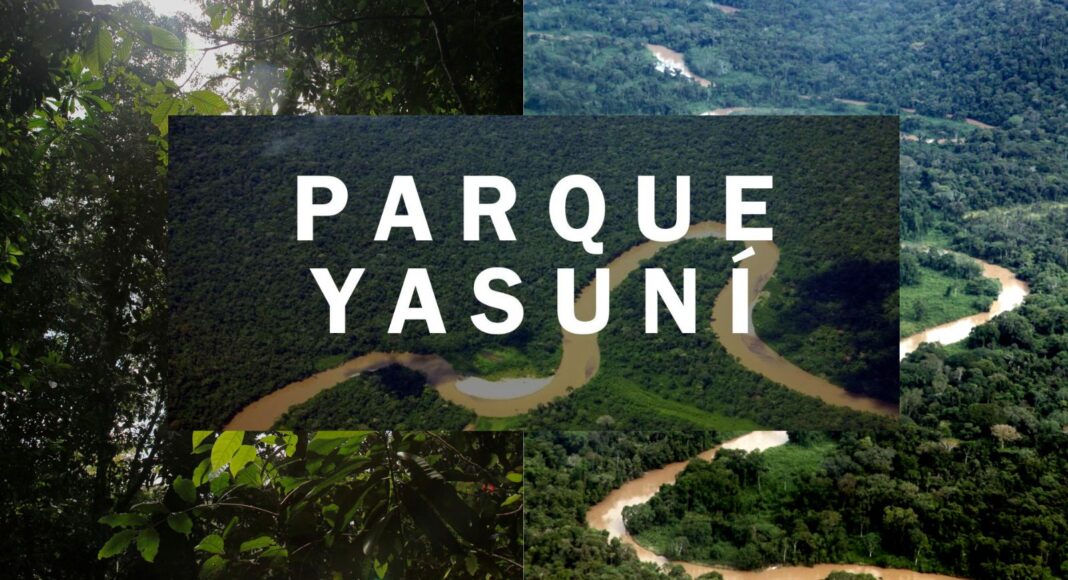Ecuadorians go to the polls on 20 August 2023 to elect both a new president and 137 legislators for the country’s National Assembly. They will also be given the choice to vote ‘Yes’ or ‘No’ in a referendum, where a ‘Yes’ vote will shut down all oil extraction in the 9,823 km2 (3,793 square miles) Yasuní National Park, as well as prevent further oil prospecting. Local voters in Quito will also be asked whether they wish to halt mining in the Chocó forests north-west of the capital in Pichincha province.
Linda Etchart weighs up the consequences of this referendum, investigates the eight presidential candidates’ opinions on the matter and spotlights the arguments of the Kichwa Napo Resiste campaign who advocate an unequivocal ‘Yes’ to shut down oil extraction, with no caveats.
Opinion polls show a majority of the voting population in favour of saving Yasuní from deforestation and from contamination of water sources caused by oil extraction. Yet, while most of the presidential candidates support the idea of keeping fossil fuels in the ground, and plan to vote ‘Yes’ to end oil drilling in Yasuní, at the same time they all expressed concerns as to how the economy would survive without the income from the park’s oil reserves. More than one-third of the government’s revenue comes from oil.
Yasuní’s 12 oil wells produce 55,000 barrels a day, providing a gross annual income of US$1,200 million. The opening of the Ishpingo, Tambococha y Tiputini (ITT) oil wells in 2016 has long been a source of conflict between environmentalists and the government. The Ecuadorian NGOs Acción Ecólogica – since the 1990s – and another important resistance group, the Yasunidos, have conducted vociferous and successful local campaigns against the wells at a local and global level, gaining worldwide support for the protection of the park’s biodiversity and for the Indigenous Taromenane and Tagaere communities living in voluntary isolation as nomads moving within different areas of the park, where the encroachment of outsiders presents an ever greater risk to their survival.
In 2007, the first administration of Rafael Correa endorsed the proposal to leave the oil in the ground, on the initiative of the then Minister of Energy and Mines, Professor Alberto Acosta. An international campaign was launched to raise US$3.6 billion from abroad to compensate the government and the country for the loss of the oil revenue that would be generated from the Yasuní oil wells. However, the ITT scheme, begun in 2010, folded in 2013, when insufficient funds had been promised (only $13 million), and even less delivered. Acosta resigned. Subsequent administrations, under President Correa and his successors, Lenin Moreno and Guillermo Lasso, continued a policy of maximum extraction in oil and minerals over the country’s Eastern provinces. Block 43, affecting Indigenous communities, was expanded.
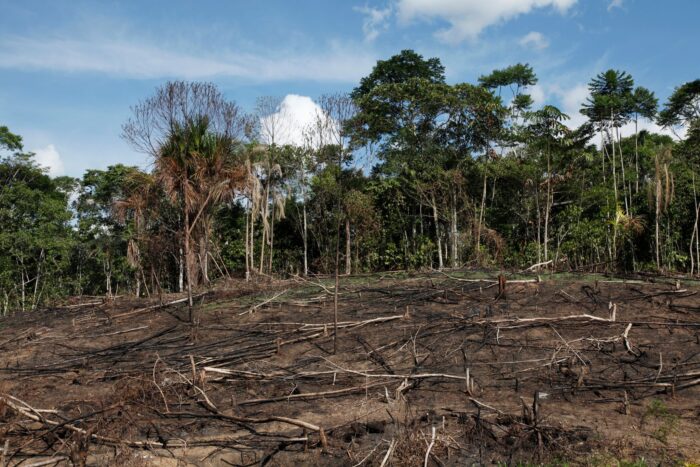
Does the favourite to win the election support the protection of Yasuní?
The favourite to win the August 20 presidency, Luisa González of Correa’s party, the Revolución Ciudadana, remained quiet on the question of the Yasuní vote until 1 August 2023, when she tweeted:
‘Why don’t you ask the countries that pollute the most to put the $1.2 billion in a trust for us?’ González demanded that those who proposed the vote should suggest an alternative to oil extraction.
González, an Evangelical Christian, represented the Social Christian Party (PSC) in 2007. As a lawyer, she worked as an assistant in PetroEcuador before joining the first administration of Rafael Correa´s presidency, followed by positions in the administration of Lenin Moreno. She is a free-marketeer. González acknowledged that there had been cases of corruption under the Correa administrations, arguing that it is impossible to monitor the activities of thousands of public servants.
What is the position of the rest of the eight candidates on the Yasuní referendum?
The Ecuadorian newspaper El Universo interviewed seven of the candidates to establish whether they would vote ‘Yes’ or ‘No’ to save Yasuní.
While endorsing a ‘Yes’ vote in principle, all of the candidates also spoke of the need to seek an alternative source of revenue for the government from international sources to make up for the economic loss from the closure of the Yasuní oil wells.
The Indigenous environmental activist candidate Yaku Pérez, who forms part of a coalition called Claro Que Se Puede (Of Course You Can), announced that he would vote ‘Yes’ on the grounds that Yasuní oil is of poor quality, and that the destruction of the rainforest resulting from oil drilling amounts to ‘ethnocide’ of the Taromenane and Tagaeri people. He described the loss of biodiversity of the area as ‘ecocide’. He too is looking for international funding to protect Yasuní. Pérez is sponsored by the Partido Socialista Ecuatoriano (PSE, Ecuadorian Socialist Party), Unidad Popular (Popular Unity), and Democracia Sí (Democracy Yes).
Yaku Pérez is no longer the candidate of the Indigenous-aligned Pachakutik party, which has been riven by ideological disputes for some time. In 2022 Pachakutik was dominated by Leonidas Iza Salazar, president of the Indigenous social movement Confederación de Nacionalidades Indígenas del Ecuador (CONAIE, Confederation of Indigenous Nationalities of Ecuador), who led an uprising against the government in 2022 which forced concessions from the Lasso administration to protect Indigenous and environmental rights. Pachakutik is now divided, with one faction under former Pachakutik leader, Marlon Santi, of the Sarayaku Kichwa, which supports Perez’s candidacy. Pachakutik itself is not fielding a candidate.
The candidate of the ADN Alliance, Daniel Noboa, was supporting a ‘No’ vote, which means his strategy was to continue to pump oil from the existing oil wells, even though he stated that he knew his position would damage his electoral chances. In the eventuality of a ‘Yes’ vote, Noboa noted that mechanisms will have to be sought to replace the resulting shortfall in government revenue. He spoke out against corruption in the oil sector.
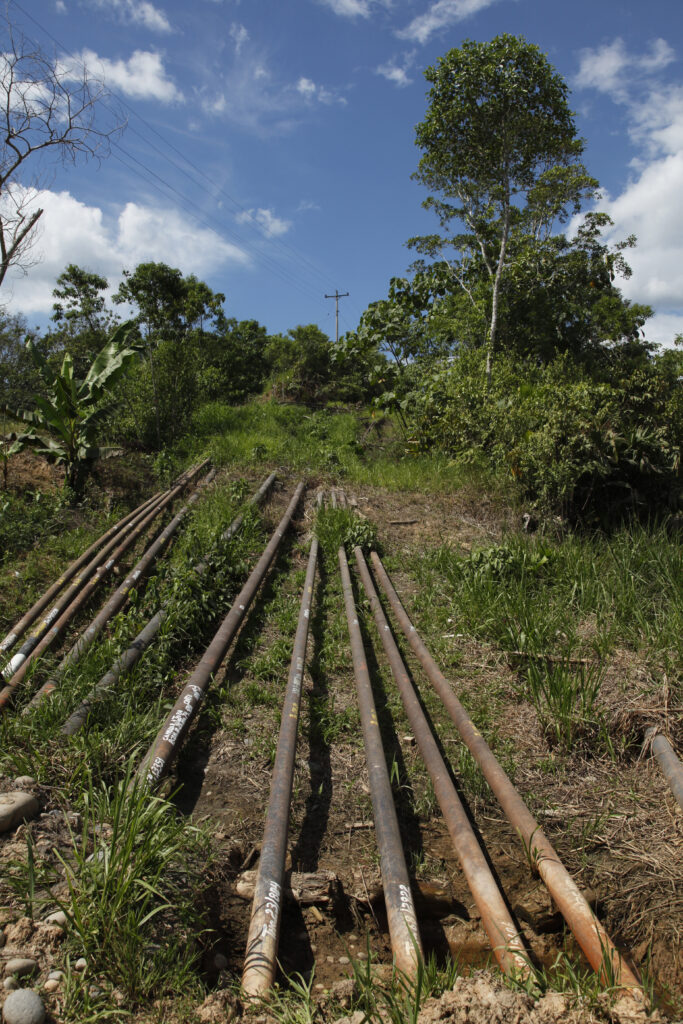
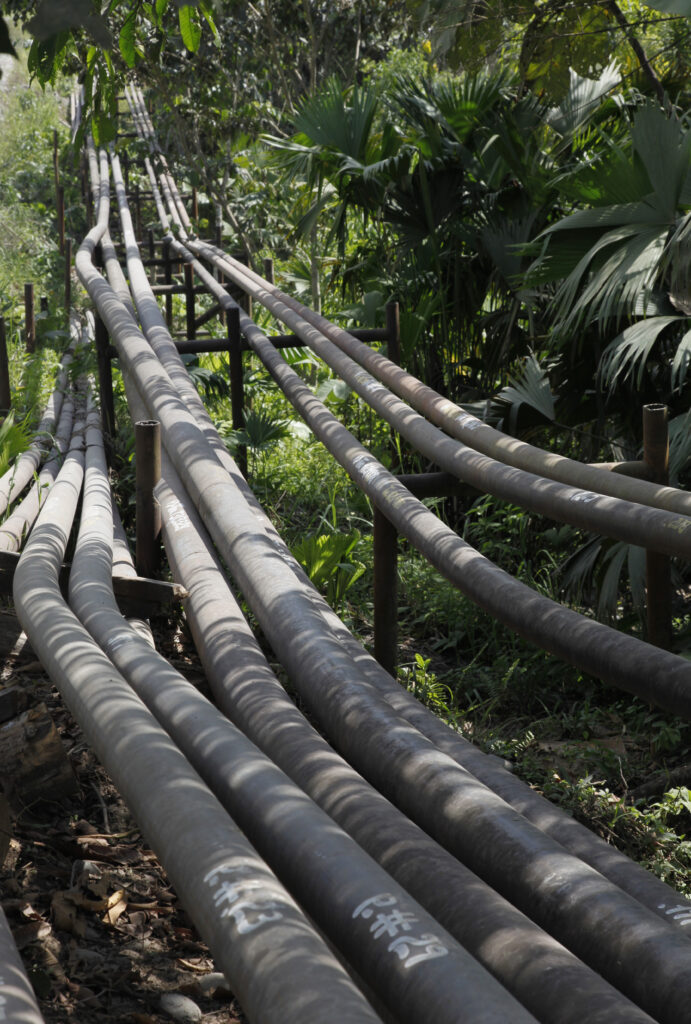
Oil pipeline in Yasuní national park. Photo: Julio Etchart
Conservative candidate Jan Topic of the Together We Will Win alliance, while supporting a transition to renewable resources, commented on the purported loss of almost US$16.5 billion of revenue by 2045 if drilling in Yasuní is halted. He warned against resorting to imposing new taxes on the population to counter the loss.
Another conservative candidate, Otto Sonnenholzner of the Actuemos alliance – Vice-President 2018-2020, economist, businessperson and broadcaster – and his running mate Erika Paredes, were planning on issuing international bonds to finance environmental conservation, health, and education. Their planned policy was to reduce Yasuní oil production by stages, to soften the impact.
Bolivar Armijos of the Movimiento Acción Movilizadora Independiente Generando Oportunidades (Amigo) party announced that he would vote ‘No’, in order to use the revenue from oil extraction to fund social programmes and to invest in free health care and education. He advocated the use of oil revenue to provide investment in improving agricultural productivity and infrastructure.
Anti-corruption candidate Fernando Villavicencio, of the ‘Alianza Gente Buena-Construye’ party, has supported the protection of Yasuní all his life, he declared. He will vote ‘Yes’, but will not campaign actively in favour of either position. He thinks that it is important to honour the existing Yasuní oil contracts until they expire in 2024. He wants to ascertain the size of the remaining reserves in Yasuní, which he believes are much less than the 1 billion barrels claimed by former President Correa. His estimate was that the reserves may be half of the reserves announced by Correa.
Xavier Hervas, of the Renovación Total (RETO) party, while advocating environmental protection, stressed the importance of expanding Ecuador’s agriculture and tourism sectors, which he argued should have benefited from investment thanks to revenue generated by oil extraction, but that funds had been diverted to benefit individual politicians through corruption. The funds should be invested in productive enterprises, he said, such as in the improvement of oil refining facilities, where alleged corruption had been reported. Meanwhile, evidence was emerging of Hervas being associated with a business based in Panama in the name of his grandfather, a revelation that undermines his supposedly ‘clean’ credentials.
Clearly the presidential candidates feel obliged to tout their environmental credentials to the voters and to the outside world, in view of the fact that the Rights of Nature are enshrined in the Ecuadorian Constitution of 2008, the architect of which was the work of Buen Vivir advocate Professor Alberto Acosta. At the same time, the candidates are hedging their bets by implying – if not directly stating – that the protection of Yasuní will depend on the provision of outside finance, reminiscent of the battle over the ITT concessions of 2010-2013.
What are Ecuadorian Indigenous leaders saying about the Yasuní referendum?
While the politicians present equivocal statements on the Yasuní vote, Ecuadorian Indigenous leaders have joined the ‘Yes’ campaign through social media postings and interviews:
Napo Resiste, an Indigenous and community movement campaigning to end legal and illegal mining on the Jatunyacu River in Napo province, called for a ‘Yes’ vote for Yasuní:
Patricia Gualinga, Kichwa from Sarayaku on the Bobonaza river, Pastaza province, and long-time global environment activist, joined the campaign, calling for a ‘Yes’ vote in her Instagram post on 1 August:
A message from Kichwa Napo Resiste spokesperson Leo Cerda
Leo Cerda, Kichwa from Serena, spokesperson for the Napo Resiste campaign and the Black and Indigenous Liberation Movement (BILM) anti-mining movement, posted his pro-Yes for Yasuní campaign speech on Instagram, advocating an unequivocal vote ‘Yes’, with no caveats:
In this important presentation, Leo explains that the referendum is the first time the Ecuadorian people have had an opportunity to choose to keep fossil fuels in the ground. Cerda envisages a post-mineral and post-petroleum economy, with a different energy matrix. He argues that the people of Ecuador have not benefited from oil extraction; instead, they have found themselves with increasing foreign debt obligations. He believes that it is possible for Ecuador to develop alternative industries. The funds are there, he claimed, in the form of taxes from the 500 companies who have continued to find ways to avoid taxes by moving profits offshore.
The referendum is the first time the Ecuadorian people have had an opportunity to choose to keep fossil fuels in the ground.
Leo Cerda
In the interview in Tena in August 2023, Leo describes the damage inflicted on his community by gold mining, and the harmful repercussions for the population of Quito of the proposed mining projects in the Chocó Andino forests in Pichincha province. The mining projects, as elsewhere, are likely to contaminate Quito’s drinking water which originates within the 28,600 hectare UNESCO-designated biosphere reserve, north-west of the capital. The Chocó Andino has not yet been declared a protected area by the Ecuadorian government, which has granted at least 12 mining concessions within the reserve that are in the prospecting stage. Further exploration will be halted if Quito voters answer ‘Yes’ in the 20 August Chocó Andino referendum—on the same day as the presidential elections and the Yasuní vote. The Chocó Andino consultation is the result of a local mining campaign that collected 200,000 signatures.
Within Cerda’s Napo province, the Ecuadorian government has granted concessions to the extractive industries covering 148 new territories, 37 per cent of the area of Napo. Of 30,000 hectares exploited, 8,000 hectares have been destroyed by gold mining. It is a loss for future agricultural production as well as for biodiversity. Mining and illegal mining are equally polluting, the legal mining becoming illegal, as Cerda argues, when rules of Free, Prior and Informed Consent (FPIC) and Environmental Impact Assessments are ignored, and waste management contractual stipulations are broken. The local authorities are complicit in this destruction of the environment, according to Cerda and other commentators, as the police, local government, the military, and the governors are corrupted by their involvement in the illegal mining operations.
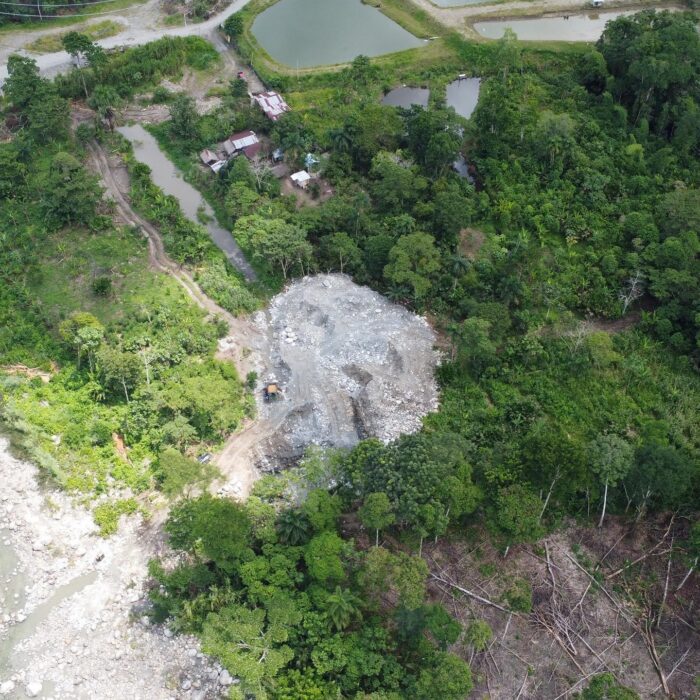
The Yasuní referendum, however, provides some hope within a bleak scenario. There is a transformation underway, driven by the younger generation, Leo Cerda insists. ‘This is a vote, ‘Yes’, for our survival, ‘Yes’, for life, ‘Yes’, for nature, and ‘Yes’, for future generations.’
Linda Etchart is a lecturer in Human Geography at Kingston University. She is the author of Global Governance of the Environment, Indigenous Peoples and the Rights of Nature: Extractive Industries in the Ecuadorian Amazon. Palgrave Macmillan, 2022.
Sources
Becker, Marc (2023) “Ecuador’s divided electoral landscape.” NACLA. 16 June 2023
El Universo (2023) “¿Cuál es la postura de los candidatos a la Presidencia sobre la consulta del Yasuní ITT?” https://www.eluniverso.com/noticias/politica/cual-es-la-postura-de-los-candidatos-a-la-presidencia-sobre-la-consulta-del-yasuni-itt-adelanto-de-domingo-nota/
France 24 (2023) “In Ecuador biosphere, battle lines form over mining plans.” 4 June. https://www.france24.com/en/live-news/20230604-in-ecuador-biosphere-battle-lines-form-over-mining-plans
Ortiz, Marjorie, Miranda, Sandra (2023) “Luisa González, tras 15 años a la sombra de su líder, busca el ‘resurgir’ correísta.” El Universo. 1 August 2023. https://www.eluniverso.com/noticias/politica/luisa-gonzalez-tras-15-anos-a-la-sombra-de-su-lider-busca-el-resurgir-correista-
Vega, Franklin (2023) “The Future of Yasuni’s Oil.” June. Rosa Luxemburg Stiftung. https://www.rosalux.org.ec/the-future-of-yasunis-oil/
Zuckerman, Adam (2013) “Rights and Responsibility: The Failure of Yasuní-ITT and What it Means for Ecuador’s Indigenous Peoples.” Amazonwatch. 25 August. https://amazonwatch.org/news/2013/0826-rights-and-responsibility-the-failure-of-yasuni.

